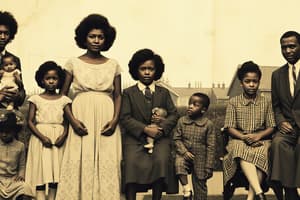Podcast
Questions and Answers
Which of the following is NOT considered a power possessed in healthy family dynamics?
Which of the following is NOT considered a power possessed in healthy family dynamics?
- The power to choose
- The power to emote
- The power to dominate (correct)
- The power to think and interpret
What is a common characteristic of dysfunctional families?
What is a common characteristic of dysfunctional families?
- Open communication between parents and children
- Negative patterns of parental behavior (correct)
- Consistent support against abuse
- Encouragement of creativity in children
Which parenting style is commonly found in dysfunctional families?
Which parenting style is commonly found in dysfunctional families?
- Supportive
- Permissive (correct)
- Structured
- Authoritative
What emotional dynamics typically occur between parents in dysfunctional families?
What emotional dynamics typically occur between parents in dysfunctional families?
Which factor could lead to dysfunctional family dynamics?
Which factor could lead to dysfunctional family dynamics?
What is a primary characteristic of a functional family regarding accountability?
What is a primary characteristic of a functional family regarding accountability?
How do functional families approach rules and flexibility?
How do functional families approach rules and flexibility?
In a functional family, how is individuality treated?
In a functional family, how is individuality treated?
What role does trust play in a functional family?
What role does trust play in a functional family?
Which of the following best describes communication in functional families?
Which of the following best describes communication in functional families?
How do family members in functional families handle differences?
How do family members in functional families handle differences?
What does the unfolding process of intimacy in functional families rely on?
What does the unfolding process of intimacy in functional families rely on?
Which situation is common in a functional family despite their healthiness?
Which situation is common in a functional family despite their healthiness?
Flashcards
Functional Families
Functional Families
Families that promote a sense of belonging and contribute to each member's self-esteem.
Accountability in families
Accountability in families
A key aspect of a functional family where members acknowledge their mistakes and work together to find solutions.
Flexible Family Rules
Flexible Family Rules
Rules are clear and consistent for everyone, but flexible enough to adapt to individual needs.
Individuality in a Family
Individuality in a Family
Signup and view all the flashcards
Meeting Family Needs
Meeting Family Needs
Signup and view all the flashcards
Trust in a Family
Trust in a Family
Signup and view all the flashcards
Clear Communication in Families
Clear Communication in Families
Signup and view all the flashcards
Negotiating Differences in Families
Negotiating Differences in Families
Signup and view all the flashcards
Core Human Powers
Core Human Powers
Signup and view all the flashcards
Dysfunctional Family Traits
Dysfunctional Family Traits
Signup and view all the flashcards
What is a dysfunctional family?
What is a dysfunctional family?
Signup and view all the flashcards
Causes of Family Dysfunction
Causes of Family Dysfunction
Signup and view all the flashcards
Emotional Disconnect in Dysfunctional Families
Emotional Disconnect in Dysfunctional Families
Signup and view all the flashcards
Study Notes
Functional Families
- Functional families are also known as healthy families
- A functional family fosters a sense of belonging and contributes to members' self-esteem
- Healthy families are not always perfect; they may have issues
- Common occurrences in functional families include yelling, bickering, misunderstandings, tension, and hurt but not constantly
Characteristics of Healthy Families
- Accountability: Families are responsible and willing to acknowledge individual and family problems. They actively work to resolve issues.
- Open and Flexible Rules: Mistakes are permitted and rules can be adjusted to meet individual needs and circumstances. Rules are clear.
- Open and Flexible Roles: Family members' roles are adaptable, enabling flexibility and spontaneity without fear of judgment.
- Individuality: Individual interests and personal boundaries are respected.
- Fulfilled Needs: Family needs are addressed.
- Trusting Relationships: Honesty and open expression of emotions, thoughts, and desires are valued more than agreement.
- Clear and Consistent Communication: Clear, respectful communication is essential, acknowledging self and others, and valuing dignity.
- Negotiating Differences: Families who value cooperation are more able to resolve conflicts.
- Intimacy as a Process: Building intimacy is essential for well-functioning families
- Five Freedoms: Ability to perceive, think/interpret, emote, choose, desire, and express creativity through imagination are essential characteristics.
- Protection from Abuse: Healthy families protect members from all forms of abuse.
- age-appropriate responsibilities: Children are given responsibilities suitable for their age.
Dysfunctional Families
- Any condition that disturbs the healthy operation of a family is considered dysfunctional.
- Negative behavioral patterns are common in dysfunctional families. Parents attempt to dominate the children
- Parents may blame each other, maintain a good front, and use defensive mechanisms to cover up their behaviors.
- Emotions between parents are often strained and may be directed more towards children than each other
- Triangles are commonplace in dysfunctional families with permissive or neglectful parenting styles.
Causes of Dysfunctional Families
- Deficient parenting
- Controlling parenting
- Permissive parenting
- Neglectful parenting
- Alcoholic or abusive parents
Studying That Suits You
Use AI to generate personalized quizzes and flashcards to suit your learning preferences.




